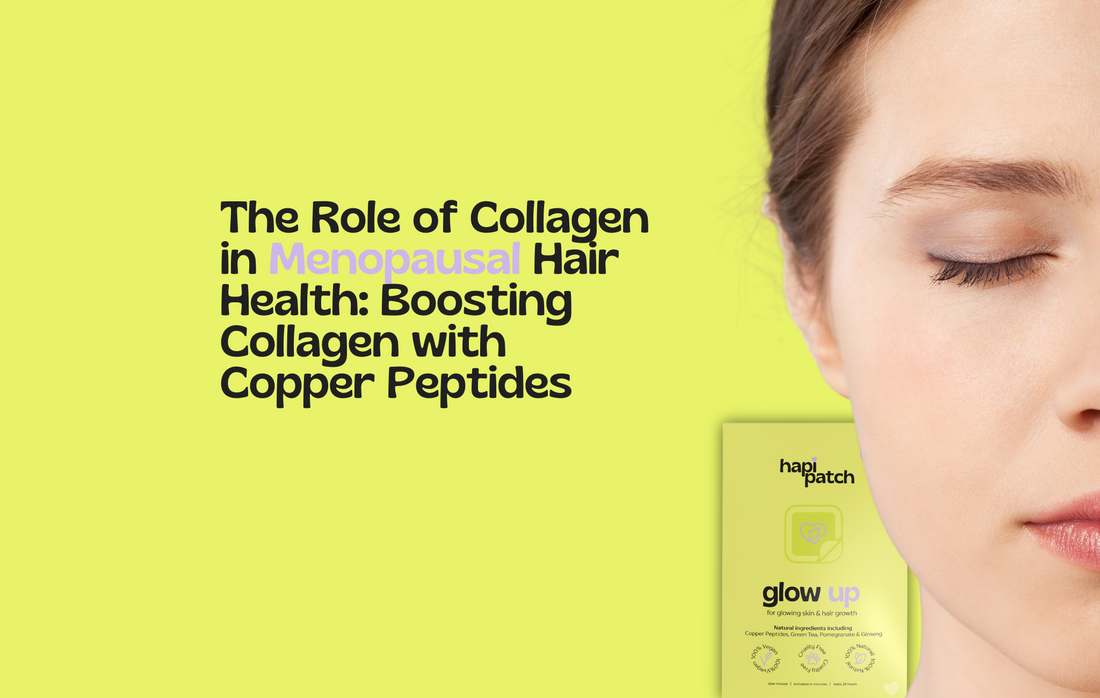Collagen is a crucial protein that plays a vital role in hair growth, supporting scalp health and the strength of hair follicles. During menopause, collagen production declines, contributing to thinning hair, breakage, and slower regrowth. In this blog, we will explore the role of collagen in menopausal hair health and how copper peptides, particularly Glow Up Copper Peptide Patches from hapi patch, help boost collagen production to restore healthy hair.
Why is collagen important for hair health?
Collagen is the most abundant protein in the human body and is essential for maintaining the structure and elasticity of the skin, including the scalp. For hair health, collagen provides several key benefits:
- Strengthening hair follicles: Collagen supports the structure of the scalp and hair follicles, helping them remain strong and resilient.
- Improving scalp health: A healthy scalp provides the ideal environment for hair follicles to function properly and grow new hair. Collagen helps maintain scalp elasticity and hydration, which promotes healthier hair growth.
- Preventing breakage: Collagen strengthens hair strands and prevents breakage, ensuring that hair remains thick and full.
How menopause affects collagen production
During menopause, collagen production declines because of lower oestrogen levels. This has a direct impact on hair health:
- Weakened hair follicles: Reduced collagen levels weaken hair follicles, leading to thinning and breakage.
- Thinning scalp: The scalp becomes less elastic and drier due to lower collagen levels, making it less able to support healthy hair growth.
- Increased hair breakage: Without enough collagen to strengthen hair strands, hair becomes more prone to breakage, leading to overall thinning.
Why shampoos can't boost collagen for hair growth
While some shampoos claim to contain collagen, these products offer limited benefits for hair growth. Here's why:
- Surface-level treatment: Shampoos and topical treatments do not penetrate deep enough to affect the hair follicles where collagen is needed.
- Temporary effects: While shampoos may improve the appearance of hair temporarily, they don't address the deeper issue of declining collagen production.
- No long-term impact: Collagen production needs to be stimulated from within, which shampoos cannot achieve.
How copper peptides help boost collagen production
Copper peptides, particularly GHK-Cu, are scientifically proven to stimulate collagen production, which is vital for menopausal hair health. Here's how they help:
- Stimulating collagen synthesis: GHK-Cu encourages the body to produce more collagen, helping to strengthen hair follicles and improve scalp elasticity.
- Repairing scalp damage: Copper peptides promote tissue repair in the scalp, ensuring a healthier environment for hair growth.
- Supporting hair strand strength: By boosting collagen production, copper peptides strengthen hair strands, reducing breakage and thinning.
Why transdermal delivery is the best option
To effectively boost collagen production and promote healthier hair growth, a solution needs to reach the bloodstream and target the scalp from within. Transdermal patches like Glow Up Copper Peptide Patches are the most effective way to deliver copper peptides directly to the hair follicles.
- Direct absorption: Glow Up patches ensure that copper peptides penetrate deeply into the scalp, stimulating collagen production at the source.
- Sustained release: The patches provide a controlled, consistent release of copper peptides over several hours, ensuring long-term support for scalp health and hair growth.
- Efficient delivery: Unlike topical treatments, transdermal patches provide direct delivery of active ingredients to the bloodstream, which boosts effectiveness.
Why Glow Up Copper Peptide Patches are ideal for boosting collagen
Glow Up Copper Peptide Patches from hapi patch offer a science-backed solution for boosting collagen production and improving hair health during menopause:
- 4-layered matrix design for optimal absorption: The patches deliver copper peptides consistently over time, ensuring long-lasting stimulation of collagen production.
- Non-hormonal, safe solution: Copper peptides offer a non-hormonal treatment for menopausal hair thinning, making them safe for long-term use.
Real results: Before and after success stories
Women across the UK have experienced significant improvements in hair thickness and strength after using Glow Up Copper Peptide Patches to boost collagen production. Here are some success stories:
- Claire, age 54: "My hair was thinning and breaking constantly. After using the Glow Up patches for three months, my hair feels so much stronger, and the breakage has reduced dramatically."
- Louise, age 50: "Menopause was wreaking havoc on my hair, but the Glow Up patches have really helped. My hair is thicker, and it feels much stronger than before."
FAQs About Copper Peptides for Collagen and Hair Health
Why is collagen important for hair health?
Collagen strengthens hair follicles, supports scalp health, and prevents breakage, all of which are essential for maintaining thick, healthy hair.
Can copper peptides help boost collagen production?
Yes, copper peptides stimulate collagen synthesis, which helps improve scalp health, strengthen hair strands, and promote hair growth.
How long does it take to see results with copper peptides?
Most women report visible improvements in hair thickness and strength within 2-3 months of consistent use.
Are copper peptides safe for long-term use to boost collagen?
Yes, copper peptides are non-toxic and safe for long-term use to boost collagen and improve hair health.
How do Glow Up Copper Peptide Patches work for boosting collagen?
Glow Up patches deliver copper peptides directly to the scalp, promoting collagen production and supporting scalp health for long-lasting hair regrowth.

